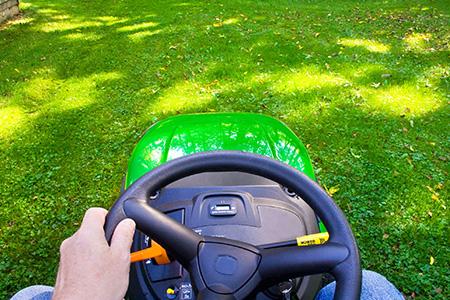- Tags:
- Working Forests

WHEN Europeans began colonizing New England centuries ago, no sooner had they set foot on shore than they began re-creating the villages they knew from home across the sea. Between clearing for agriculture, firewood and timber, and later fueled in particular by the woolen mills that gave rise to the sheep boom of the 19th century, the region was left merely 25 percent forested by 1850.
We came, we saw, and we sawed some more.
Today, a similar migration pattern continues as urban and suburban dwellers move to "the country." As soon we take ownership of our 2-acre, 5-acre or 10-acre patch of the rural landscape, we seem compelled by some deep-rooted need to start making weekly runs to Home Depot for the accoutrement of the suburban aesthetic: patio bricks, outdoor lighting, grass seed and fertilizer, leaf blowers and the biggest riding mower we can afford. We scratch a desperate itch to re-create what we know: the "humanized" landscape of lawns and paved driveways.
Vast lawns, too - even though most of us have forgone the sheep. Instead, we spend inordinate hours mowing, keeping the forest at bay for little productive purpose. We are driven by our sense of aesthetics. We want things to look "nice and neat." We relish our highly artificial cultivated oasis in the woods, and we're willing to spend hard-earned money on equipment, fuel and fresh water to maintain it.
We came, we mowed, and we mowed some more.
Then we watered and mowed again.
It is the century of the Lawn Boom, and we can't seem to stop ourselves. In the city of Rochester, they've even contemplated mandating lawn-mowing.
And though personally I am fortunate enough to have larger acreage that is a Certified Tree Farm, I am little different. Last week, graced with a rare meeting-free evening, I spent it atop a smelly, noisy machine, mowing. My dog, dejected, lay in the driveway wondering why we weren't sniffing things in the woods instead. The horses - on the other side of the fence, where they think the grass definitely isn't greener - stared in bug-eyed disbelief; why would anyone waste perfectly good food like that?
I hate every minute of it, and hate that I do it. And once finished, like a junkie on a high, I stand back and admire how nice it looks. I am a man of my time, the Lawn Era. I am, despite myself, a Lawnist. Not a particularly skilled one, but a Lawnist nonetheless.
(As a friend of mine noted, close inspection of his lawn and mine would suggest that we are, in truth, closely cropped Weedists. I suppose there's small satisfaction in eschewing the monoculture of a so-called perfect lawn. The horses, for their part, favor eschewing the grass.)
What should bother us all about this is what this addictive aesthetic does to our landscape. It is not sustainable, but rather spectacularly wasteful - and not particularly useful. The suburban aesthetic inexorably continues to convert open land and forest to lawns and patios. That's among the reasons that the U.S. Forest Service has identified the Salmon Falls and Merrimack River watersheds as two of the most threatened in the country with regard to potential decline in water quality due to the conversion of private forested lands to housing.
Ironically, when we ask ourselves what we value, we often offer up quality-of-life things such as ample clean water, productive farmland, scenic landscapes, wildlife habitat and outdoor recreation. These are exactly the things that our forests and open space provide. And then we go turn forest into lawn, stand back and sigh in ecstatic satisfaction at how nice it looks.
One of these days we will turn on the sprinkler and wonder why there's no water. We will be looking at one of the answers to our own question.
Once ingrained in to our psyche, the weed-whacker aesthetic extends into the woods themselves. We want to "clean up the woods," as if a fallen leaf or a branch is somehow out of place. Forest disturbance, whether by weather or by the purposeful hand of man, is seen as "messy." Our view of the forest becomes skewed by the green lens of the Lawn Era.
I don't know how we break this habit. They say the first step to recovery is to admit the problem. So, my name is Jack, and I am a Lawnist. If you ever find me loitering around the local lawn-and-garden center looking to score a deal on a 48-inch self-bagger, it's time for an intervention. You have my permission to tell me to put down my leaf blower and surrender with my hands up.
